Why Does My Dog Check On Me When I’m Sleeping? [Protection or Dominance?]
Imagine dozing off in the middle of the night, only to find your furry friend poking or nudging you for attention. Does this sound familiar? If you’ve ever wondered why your dog checks on you when you’re sleeping, you’re not alone.
This phenomenon has left many pet owners both puzzled and curious about their canine companions’ nocturnal behaviors.
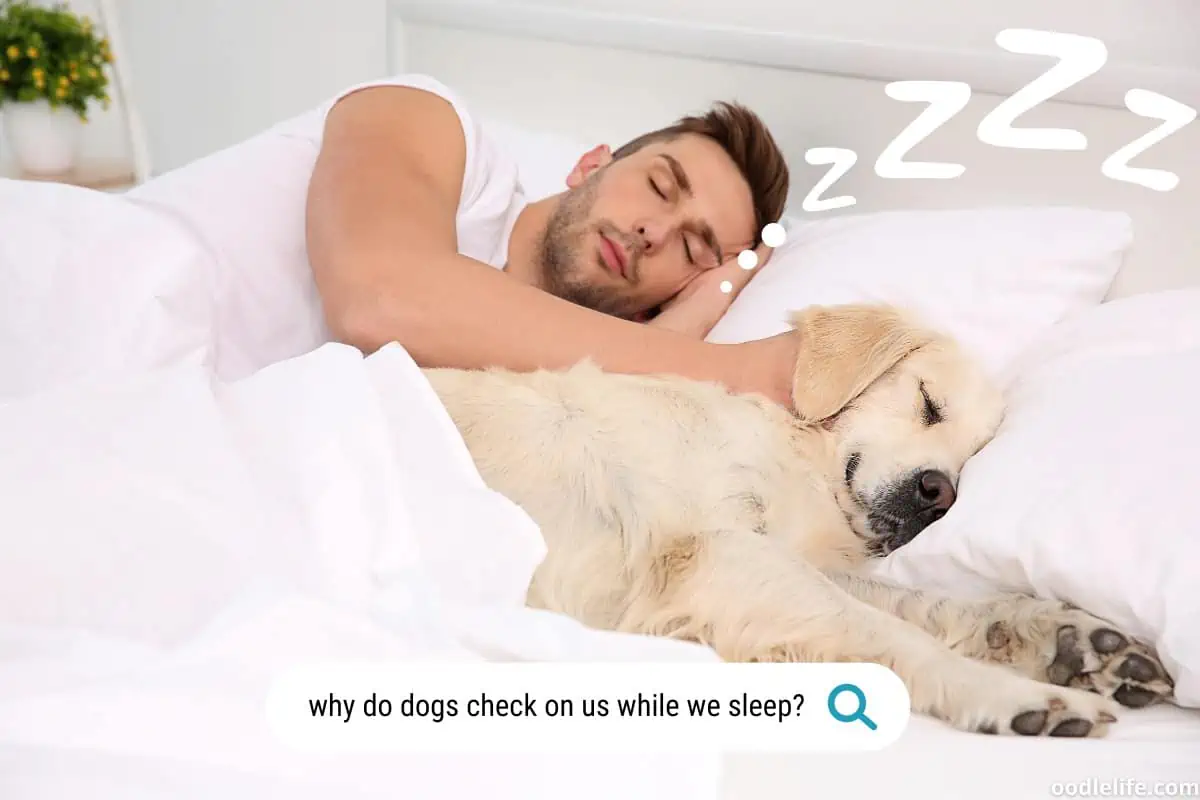
There are a variety of reasons that could explain why your dog seeks your attention while you’re catching some Z’s. These reasons range from the heartwarming fact that they love you, to practical matters like hunger or restlessness.
Understanding these factors can help strengthen the bond between you and your four-legged friend, and give you peace of mind during those nighttime snuggles. Read on to learn more about the intriguing reasons behind your dog’s nighttime check-ins.
Understanding Dog Behavior at Night
Whether you’re tucked in for a good night’s sleep or drifting off into dreamland, your canine companion might exhibit behaviors that intrigue, amuse, or mystify you. Let’s look into some common reasons dogs check on their humans at night, and the unique psychology behind these behaviors.
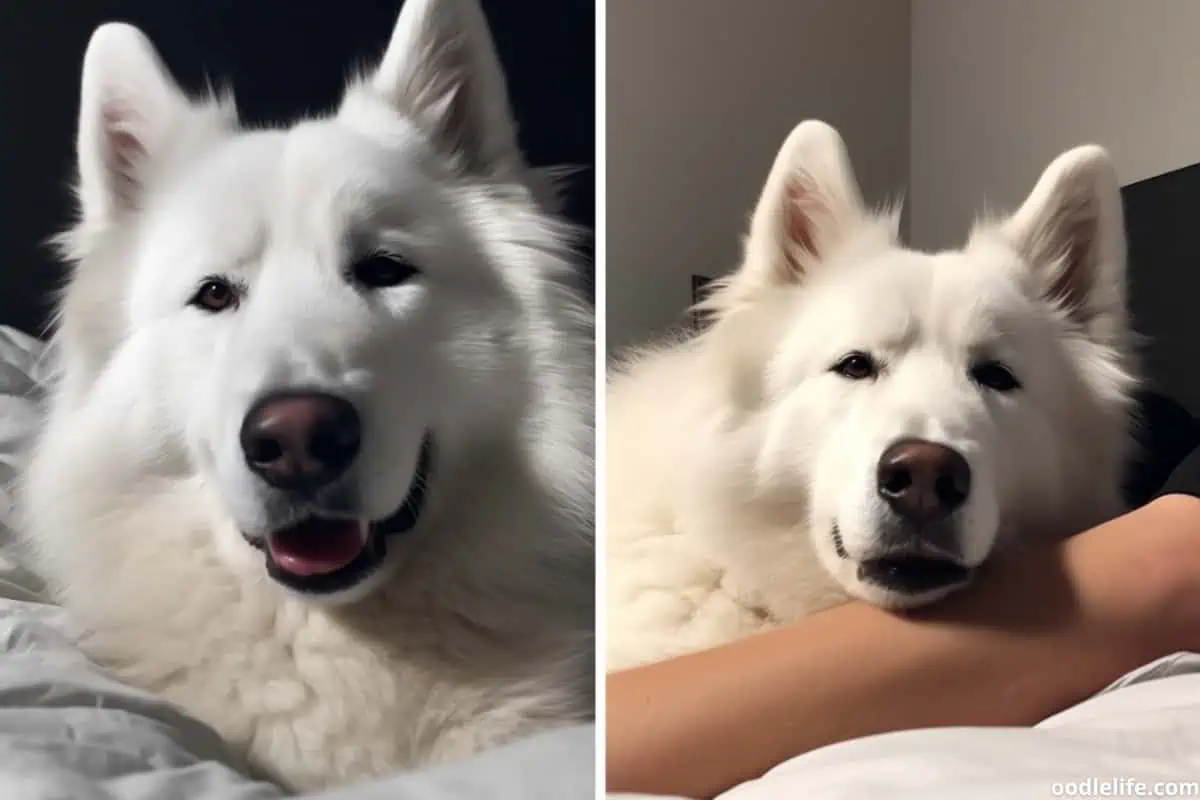
Pack Instinct
Dogs are pack animals by nature, and they view their human families as a part of their pack. It’s common for dogs to feel a strong sense of loyalty and protectiveness towards their packmates.
In the wild, wolves and other canines keep an eye on their pack members throughout the night, ensuring the safety of the entire group. This hardwired instinct for togetherness often carries over to our domesticated pooches, who make sure their favorite humans are safe and sound during those nocturnal hours.
Separation Anxiety
Just like humans, dogs can experience separation anxiety with their loved ones. This anxiety may be heightened when they can’t see or hear their humans, like during the night when their humans are fast asleep.
To relieve this anxiety, your dog might check on you multiple times throughout the night, making sure you’re still nearby and in the same cozy spot they left you in. This doggy bed check can be their way of saying, “I love you and want you to be okay!”
Protective Instinct
Many dogs possess a natural protective instinct, especially towards their human family members. This desire to keep their loved ones safe can lead them to patrol the house at night, including checking on you while you snooze.
For example, your dog might feel the urge to investigate a noise outside the window or a creaky floorboard. After inspecting the potential threat, your dog may return to you, ensuring that you’re safe and sound before heading back to their own slumber.
In conclusion, next time your furry friend checks up on you while you’re catching some Z’s, remember that they’re just doing their job as a loyal pack member, loving companion, and dedicated guardian. Sleep soundly knowing that in the eyes of your dog, you’re worth checking on.
Common Reasons for Dogs Checking on You
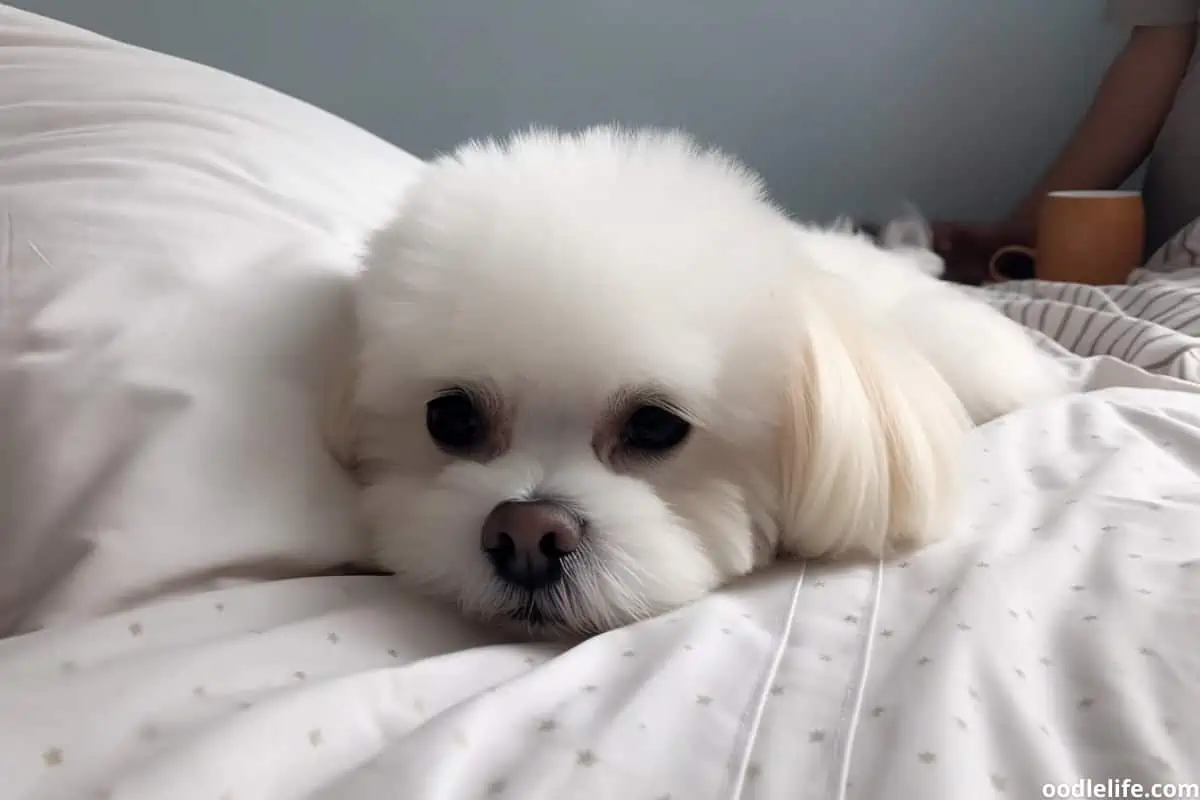
Comfort and Affection
One of the primary reasons dogs check on their sleeping owners is simply a display of affection. It’s their way of saying, “Hey, I love you, and I just wanted to make sure you’re okay.” These furry creatures are known for their loyalty and devotion to their human family members, and this behavior is just another way they demonstrate their care for you.
Just like humans, dogs can’t resist the urge to cuddle up to their loved ones for warmth and comfort. If your dog curls up next to you during the night, it’s a sign that they feel secure and satisfied with their surroundings.
Restlessness and Boredom
Another reason dogs may check on you while you’re sleeping could be that they’re feeling restless or bored. Since dogs are highly energetic creatures, they might have extra energy to burn off, and they suspect sleeping humans won’t mind being woken up for a fun game of fetch in the wee hours of the morning, right? If only they knew.
Furthermore, a bored dog is a creative dog when it comes to trying to get attention from their snoozing human. They might trot around, paw at you, or even plant a sloppy kiss on your face, all in an effort to get you to play or provide some much-needed entertainment.
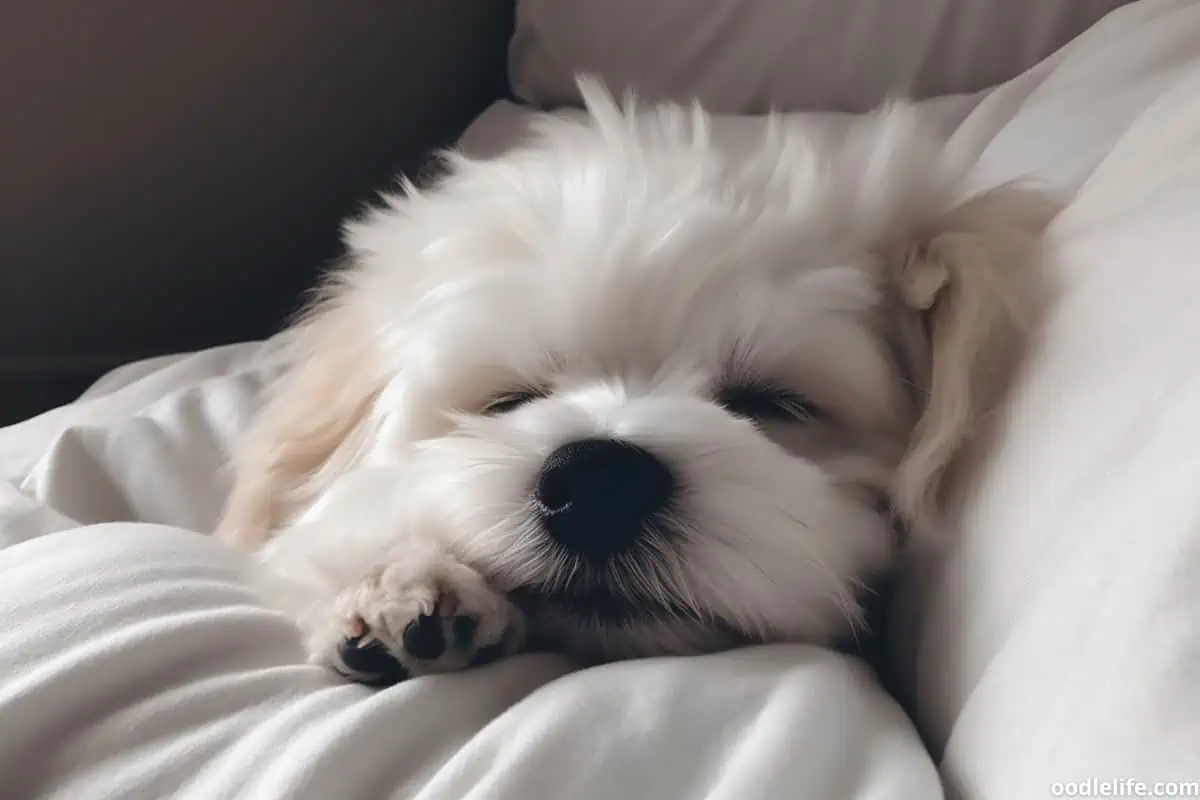
Security and Attachment
It’s no secret that our dogs often double as expert security guards, ensuring our safety day and night. If your dog is checking on you while you’re sound asleep, it could stem from their instincts to protect and monitor their human pack. They might be making the rounds, seeing that all is well and that everyone in their “pack” is accounted for.
The protective nature of dogs can also be linked to attachment issues. Some dogs may develop separation anxiety, which results in them becoming overly clingy, even during the night. In these cases, your dog may be checking on you simply to ensure you’re still there, alleviating their anxiety and providing solace in your presence.
Signs of Anxiety in Dogs
Body Language
When it comes to understanding whether our furry friends are anxious, body language speaks louder than barks. Dogs experiencing anxiety might exhibit subtle behaviors like ears pinned back, excessive lip licking, or yawning. In more extreme cases, they might tuck their tails between their legs or even tremble.
Like a furry detective, you can learn a lot about your dog’s emotional state by observing their body language. If your dog is constantly checking on you while you sleep, they might be trying to communicate their own discomfort or restlessness.

Sleep Schedule
Is your dog tossing and turning all night like an insomniac on a caffeine binge? Changes in their sleep schedule could be a sign of anxiety. Restlessness and frequent waking are common indicators of an uncomfortable or anxious pup.
An erratic sleep schedule might be one of the reasons your dog is checking on you during the night. While it’s not quite as reliable as your phone’s alarm clock, your dog’s internal snooze button is sensitive to their emotional well-being.

Unusual Sounds
If you’re a light sleeper or suffering from acute dog-parent instincts, you might notice unusual sounds coming from your canine companion. Whining, whimpering, or constant sniffing can be telltale signs of anxiety in dogs.
Just like humans, dogs can have their own unique way of dealing with stress, and sometimes that involves keeping an eye (or ear) on their favorite human. Don’t be surprised if they suddenly start to channel their inner canine Pavarotti in hopes of easing their fears.
By tuning into these signs, you can better understand and support your dog’s emotional well-being. Don’t forget that laughter is the best medicine, and the occasional tail-wagging anecdote or furry analogy can go a long way in reassuring both you and your dog.
Addressing Your Dog’s Nighttime Behavior
Understanding why your dog checks on you while you’re sleeping is the first step in addressing this nighttime behavior. It’s essential to establish a routine, create a comfortable spot, and implement effective training techniques to ensure a restful night for both you and your furry friend.
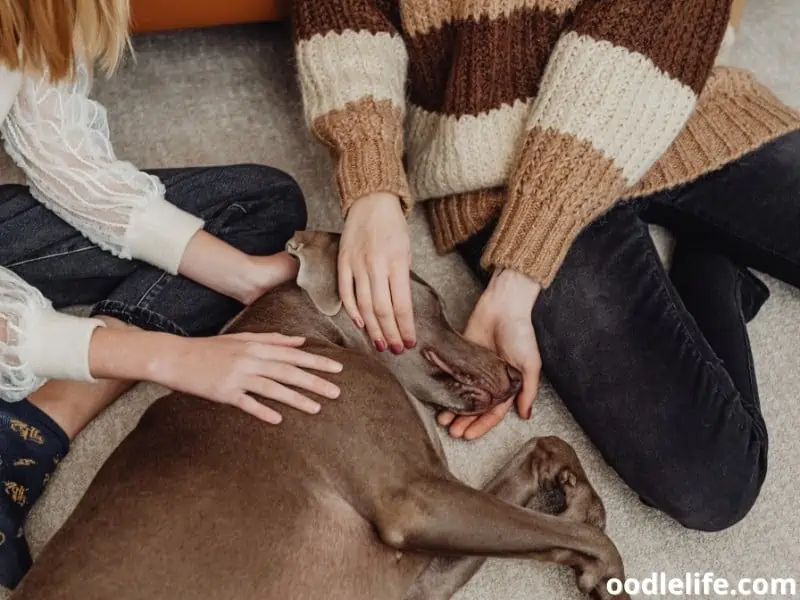
Training Techniques
One way to discourage your dog from checking on you during the night is to teach them the “settle” or “go to bed” command. This can be done by rewarding your dog for settling down in their own bed with treats or praise. To make this training more effective, practice this command throughout the day, and not only during the sleeping hours. Consistency is key to seeing results.
Establishing a Routine
Just like humans, dogs benefit from a routine. Establish a consistent bedtime routine that might include a pre-bedtime walk, designated potty breaks, and a fixed time for going to bed. This will help your dog understand when it’s time to sleep and reduce the need for them to check on you at night. Consistency in feeding times may also help your dog feel more settled and less prone to be awake during the night.
Creating a Comfortable Spot
Ensuring your dog has a comfortable sleeping area can make a big difference in their nighttime behavior. Invest in a high-quality dog bed designed for their size and breed, and consider placing it close to your bed so they feel secure. Adding a favorite toy or blanket may further encourage your dog to sleep in their own space instead of checking on you throughout the night.
Breed-Specific Behaviors
When it comes to dogs checking on their humans during sleep, some breed-specific behaviors may play a role. Let’s take a look at how German Shepherds and other common breeds might exhibit different tendencies when it comes to this nocturnal vigilance.
German Shepherd
German Shepherds are known for their loyalty, protectiveness, and intelligence. It’s no surprise that they might be more inclined to keep an eye on their human companions during the night. With their natural instincts as guard dogs, German Shepherds may feel the need to ensure their owner’s safety even while they sleep. So, if your German Shepherd checks on you during the night, you can thank their heritage for such a dedicated, watchful guardian.
But don’t worry! Your furry friend’s nighttime visits aren’t all about work. German Shepherds are also known for being loving and affectionate, meaning they could just be seeking a little quality time with their favorite person (that’s you!).
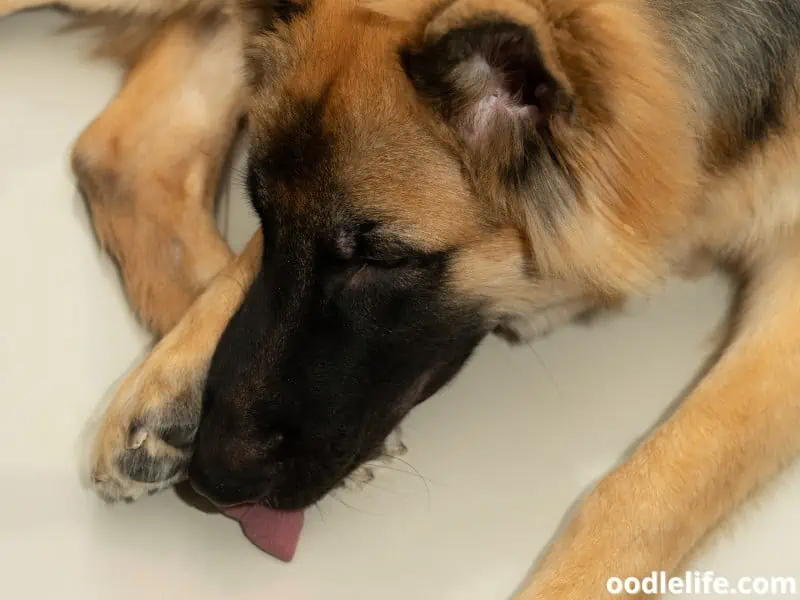
Other Common Breeds
While the German Shepherd is a prime example of a breed that might display this behavior, other breeds can also exhibit nighttime check-ins. For example, Labrador Retrievers are known to be incredibly loyal and may also feel the need to ensure their owner’s safety at night. On the other hand, a small dog like a Dachshund, while not as imposing as a large breed, might also feel a similar sense of protectiveness over their human family.
Similarly, some breeds may be naturally more curious and find themselves peeking in on you while you slumber. After all, what could be more fascinating to a dog than watching their human sleep? It’s like their very own late-night mystery show!
Just remember, no matter the breed, each dog is unique and may have their own reasons for checking in on you during the night. All adult dogs DO sleep a lot but different breeds and genders will sleep more (University Study).
Be it love, loyalty, or just plain curiosity, your four-legged friend is simply making sure you’re well-rested and ready to face another day together.
Caring for Your Dog’s Needs
As a pet owner, it’s essential to understand and cater to your dog’s needs to ensure their overall well-being. Let’s explore some ways to take care of your furry friend’s essential requirements during their waking hours so they can let you sleep soundly at night.
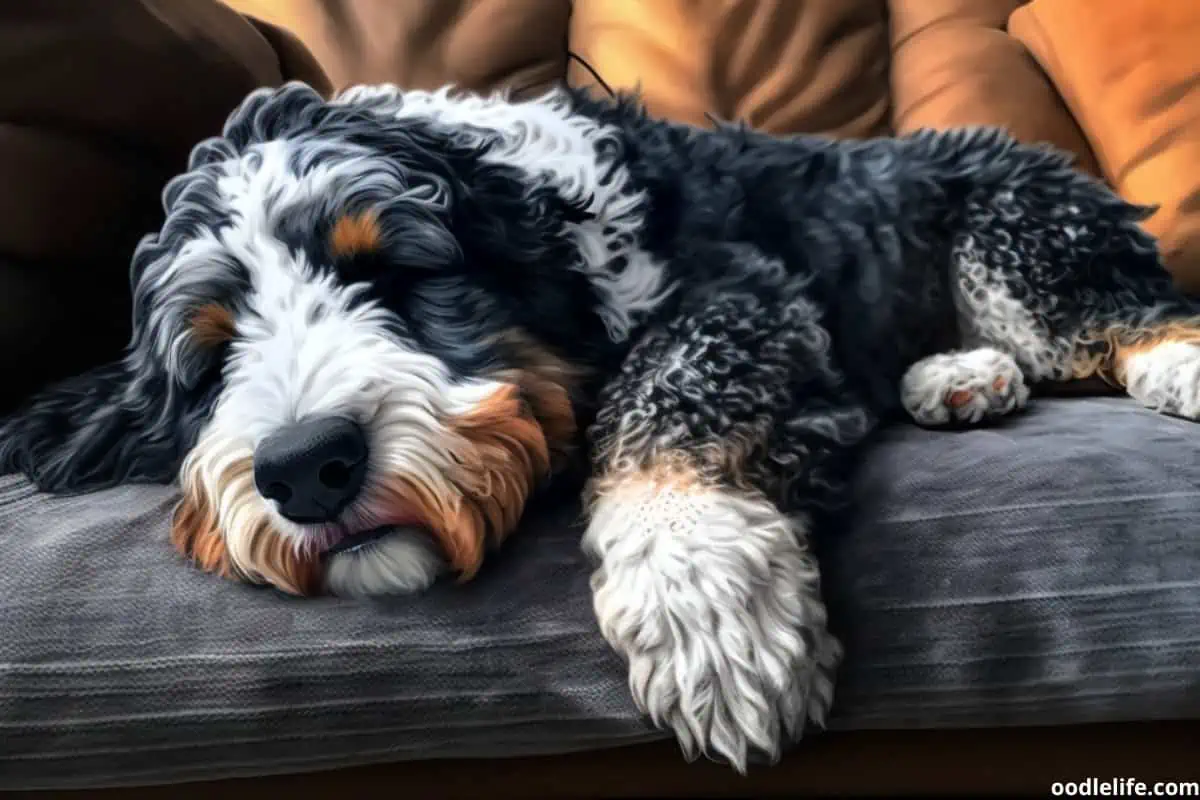
Feeding Schedule
Establishing a consistent feeding schedule is crucial for your dog’s health and happiness. By providing meals at the same time daily, you’ll ensure they stay satisfied and less likely to wake you up from hunger. It’s usually best to split their daily food intake into two smaller meals, one in the morning and one in the evening. An example of a feeding schedule would be 7 AM and 6 PM.
Keep in mind that a dog’s breed, age, and activity level can impact their nutritional requirements, so be sure to adjust their diet accordingly. When in doubt, consult your vet for professional advice.
Exercise Requirements
Ensuring your dog gets regular physical activity is crucial to maintaining their energy balance and mental health. A well-exercised dog is more likely to sleep soundly rather than wander around at night, disturbing your beauty rest. Depending on your dog’s breed and age, daily exercise could encompass anything from a leisurely stroll to a more energetic game of fetch.
A fun way to make sure both you and your pup get some exercise is by incorporating a daily walk or play session into your routine. And remember, a tired dog is a quiet (and less bothersome) dog!
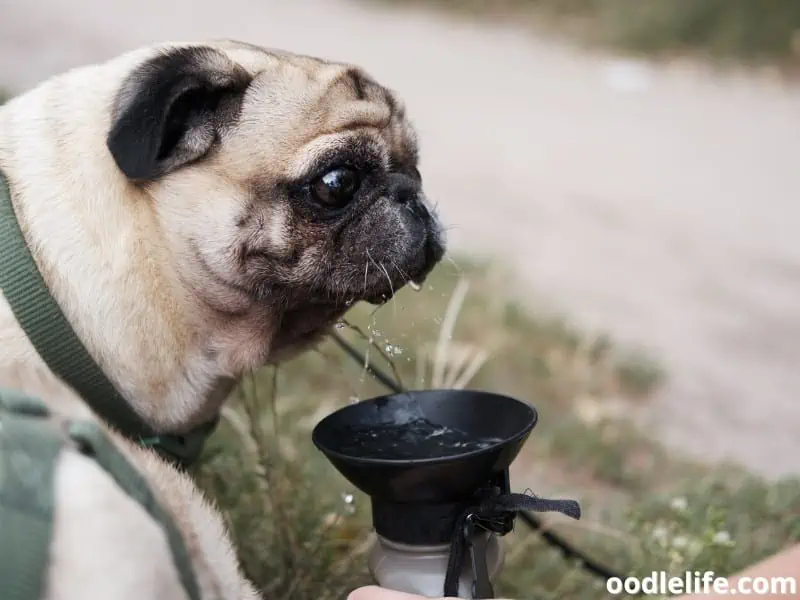
Signs of Health Issues
Being proactive in identifying potential health problems can save you and your dog from experiencing sleepless nights. If your dog continuously checks on you while you’re asleep, it could be a sign they’re experiencing discomfort or pain. Keep an eye out for indicators such as changes in appetite, excessive licking, or unusual vocalizations.
If you notice any concerning symptoms, don’t hesitate to consult with your veterinarian for proper diagnosis and treatment. They’ll be able to provide professional guidance and ensure both you and your pet can enjoy a peaceful night’s rest.
In conclusion, helping your dog feel secure, well-fed, and properly exercised can go a long way in letting you get the rest you deserve. By understanding and addressing your dog’s needs, you’ll not only improve their quality of life but also create an environment that allows for a more harmonious human-canine bond.
Dealing with Separation Anxiety in Dogs
Recognizing the Signs
Separation anxiety in dogs can manifest in various ways; whether your furry friend is a puppy or an adult dog, being aware of the signs is crucial.
Some common symptoms include destructive chewing, howling, barking, whining, digging or scratching at doors, and even urination and defecation in otherwise house-trained dogs. As a responsible dog owner, it’s essential to keep an eye out for these behaviors, but also remember to balance vigilance with a lighthearted approach.
After all, we’ve all had those days that just “ruff” us up, right?
![Why Does My Dog Check On Me When I'm Sleeping? [Protection or Dominance?] 1](https://www.oodlelife.com/wp-content/uploads/2023/04/french-bulldog-train-1024x683.webp)
Providing a Safe Environment
Creating a safe and comforting environment can help alleviate your dog’s separation anxiety. It is crucial to provide them with a designated space where they feel secure when you’re not at home.
This may include giving Fido his own corner with a cozy bed, toys, and perhaps some soothing music. As an extra touch, leaving an item with your scent (like an old T-shirt) can help your dog feel less alone.
Remember, there’s no “one size fits all” solution for calming your dog’s anxiety – think of it as a tailored suit for your pup’s individual needs.
Seeking Professional Help
If your dog’s separation anxiety continues to persist despite your best efforts, it might be time to call in the experts. A professional dog trainer or veterinary behaviorist can create a customized behavior modification program tailored to your dog’s needs.
Think of them as Sherlock Bones, solving the mystery of your dog’s anxiety one step at a time. With their guidance, soon enough, you and your furry companion can achieve more peaceful nights – allowing both of you to dream about long walks and belly rubs.